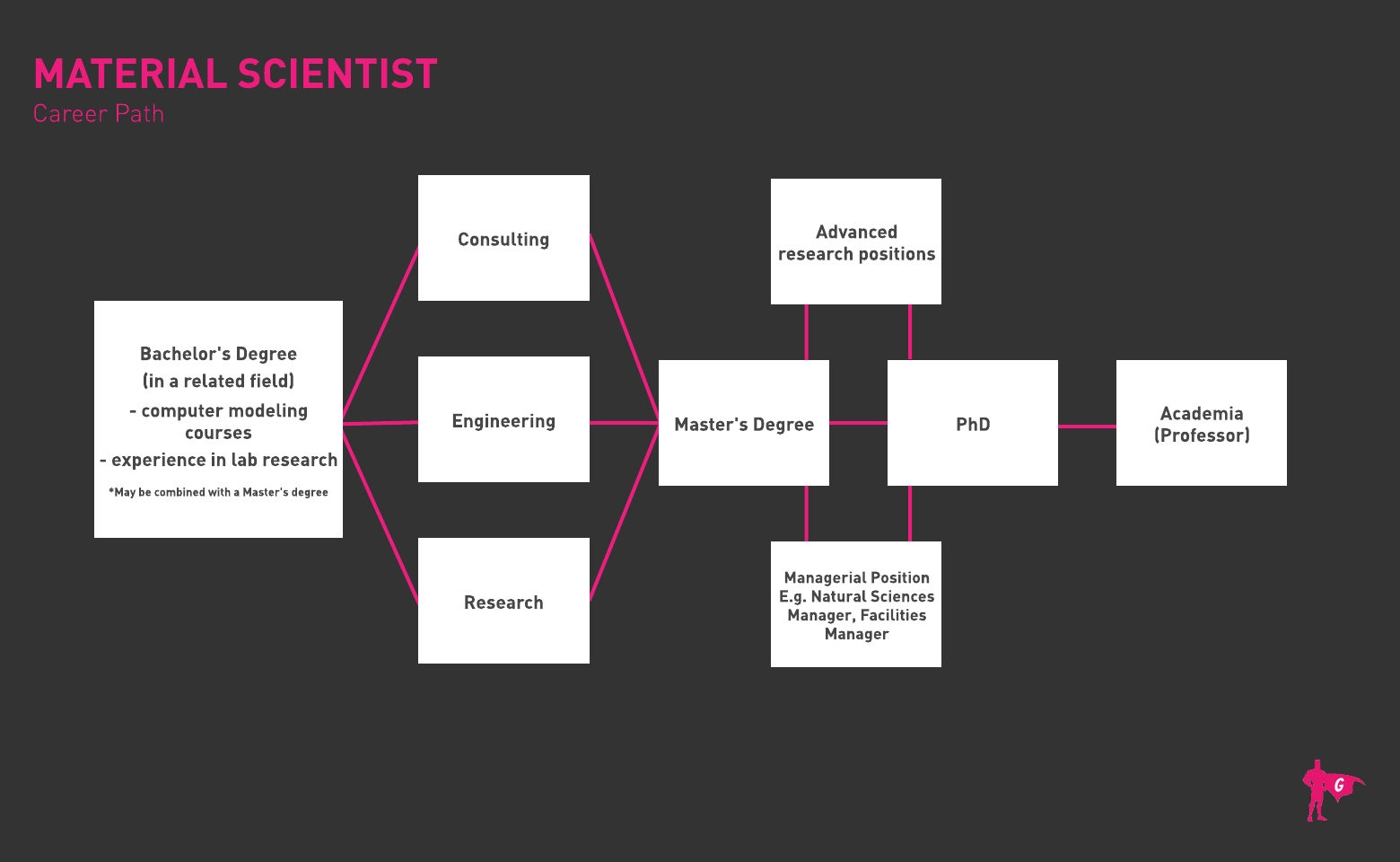스포트라이트
비슷한 제목
- 폴리머 재료 컨설턴트
- 연구 개발 과학자 (R 및 D 과학자)
- 연구과학자
- 유리 과학자
- 세라믹 과학자
- 야금 과학자
- 폴리머 과학자
- 복합재 엔지니어
- 생체 재료 과학자
- 나노 재료 과학자
작업 설명
재료 과학자들은 제조 된 제품의 품질을 결정하고 제품을 개선하며 신제품을 개발하기 위해 천연 또는 합성 재료 (예 : 금속, 고무, 세라믹, 유리 등)의 구조와 화학적 특성을 연구합니다. 이러한 작업에는 효능을 향상시키기 위해 재료를 강화하거나 결합하는 것이 포함될 수 있습니다.
경력의 보람있는 측면
- 개념에서 최종 결과에 이르기까지 프로젝트에 참여하는 것으로부터의 만족
- 다양한 분야의 다른 전문가 (예 : 엔지니어 및 가공 전문가)와 함께 작업하고 배우십시오.
- 지적 자극
인사이드 스쿱
직무 책임
연구
- 기본 연구 : 재료의 구조, 구성 및 특성 (예 : 금속, 세라믹, 합금, 윤활유 및 폴리머)에 대한 연구를 계획하고 실행합니다.
- 응용 연구 : 기본 연구에서 얻은 정보를 사용하여 신제품을 개발하거나 기존 제품을 개선하십시오.
- 연구 과정 전반에 걸쳐 상세한 노트를 기록하십시오.
실험
- 컴퓨터 모델링을 사용하여 적용된 힘 또는 다른 치료에 대한 다양한 재료의 반응을 연구하십시오.
- 재료에 대한 테스트를 수행하여 안전 및 품질 표준을 충족하는지 확인합니다.
- 제품 및 응용 분야에 사용될 때 결합 재료 또는 새로 개발 된 재료의 효능 결정
보고서
- 다른 과학자, 스폰서 및/또는 고객이 사용할 방법과 결과를 나타내는 기술 및 세부 보고서를 준비합니다.
- 또한 다른 과학자들에게 결과를 구두 / 시각적으로 제시해야 할 수도 있습니다.
필요한 기술
소프트 스킬
- 비판적 사고
- 연역적 추론
- 서면 및 구두 의사 소통
- 조직/시간 관리
어려운 기술
- 물리학
- 화학
- 엔지니어링 및 기술
- 수학
기술 능력
- 컴퓨터 모델링 소프트웨어
- 분석/과학 소프트웨어(예: SPSS)
- 스프레드시트 소프트웨어(예: Excel)
다양한 유형의 조직
- 산업 제조 회사
- 정부
- 학계(대학/대학)
- 물리, 공학 및 생명 과학에 종사하는 기업을 위한 연구 개발
기대와 희생
공부와 훈련에 많은 시간을 할애
현재 동향
- 플라스틱 이상의 3D 프린팅(예: 유리, 세라믹)
- 가전 제품을위한 새로운 재료 (예 : 도자기와 유리로 스마트 폰 제작)
교육 및 훈련 필요
기본 요구 사항
- 초급 수준의 직업을위한 관련 분야 (예 : 화학, 재료 과학, 재료 공학)의 학사 학위.
- Requisite courses for attaining skills in computer modeling, which is heavily relied upon in research and development programs. Also courses in organic, inorganic, and physical chemistry, along with plenty of math, physics, biological sciences, computer science, and labs.
- O*Net reports that 38% of Material Scientists have a bachelor’s, 24% a master’s, and 24% a PhD
- College programs should ideally be accredited by the American Chemical Society
- 많은 고용주가 신입 사원에게 조직 내 기능에 맞는 실무 교육을 제공 할 것입니다.
- 실험실 작업은 종종 인턴십, 협력 프로그램 또는 실무 학습 경험을 통해 수행됩니다.
팁
- Some fast-tracked programs offer a combined bachelor’s/master’s in Chemistry, and accelerated 4+1 BS/Master’s dual degree programs.
- 일부 화학 프로그램은 재료 과학 전문 분야를 제공합니다.
경력 향상
- 연구 직책에 대한 관련 분야의 석사 학위 또는 박사 학위
- 대학원 과정에는 의약 화학과 같은 하위 분야 주제가 포함될 수 있습니다.
- 추가 인증에는 다음이 포함됩니다.
- Society of Tribologists and Lubrication Engineers - Certified Lubrication Specialist
- The Association for Materials Protection and Performance - Corrosion Specialist and Protective Coatings Specialist
- World Safety Organization - WSO Certified Hazardous Materials Supervisor
고등학교/대학 시절 즐길거리
- 고등학교에서는 대학 진학을 준비하기 위해 화학, 수학 및 컴퓨터 과학 분야의 고급 수업에 참여하십시오.
- 대학에서는 인턴십, 펠로우십 또는 실무 학습 프로그램을 통해 실험실 연구 경험을 쌓으십시오.
- 경력 목표를 매핑하여 대학원 학위를 원하는지 또는 필요한지 결정하십시오.
- 가속 이중 학위 학사 / 석사 학위를하고 싶은지 결정하십시오.
- 어떤 학습 방법이 자신에게 더 효과적인지 결정하십시오 - 직접, 온라인 또는 하이브리드. 일부 학생들은 학부 학위와 석사 학위를 온라인으로 선택할 수 있습니다.
- 전공을 강화하기 위해 적절한 선택 과목에 대해 학업 고문과 협력하십시오.
- Figure out what you want to specialize in, such as ceramics, glasses, metals, nanomaterials, polymers, and semiconductors
- Join professional organizations such as the American Chemical Society to network, stay engaged, and discover opportunities
- Keep up with industry trends by reading the Journal of Materials Science, Materials Today, and other relevant publications
일반적인 로드맵

1차 직장에 도착하는 방법
- College summer/semester internships allow for networking within a company: Build connections during these internships to gain references and potentially roll into a full-time position after graduation
- Networking is also facilitated through college/university activities and events. Work with your school’s career center to find jobs, polish your resume, and practice interviewing.
- LinkedIn: 예비 고용주는 귀하의 프로필을 보므로 귀하의 프로필이 업데이트되고 귀하의 기술과 업적을 효과적으로 반영하는지 확인하십시오. 메시지도 정기적으로 확인하십시오.
- 온라인 응용 프로그램 - 일반적으로 직업 검색 엔진을 통해, 예를 들어 몬스터 (정보를 입력, 재개의 PDF를 첨부, 전송)
- Old-school method: get in your car, and drive up to the office with a copy of your resumé. Keep appearing at the office if that is what it takes. This is also the best way to see the work environment and what you’ll be doing, to determine if you really want to work at that location
- Consider where Materials Scientists are employed! 25% of workers are employed in R&D, 15% in chemical manufacturing, 14% in company management, 10% in computer/electronic product manufacturing, and 7% in architectural, engineering, or related services
- Move to where the jobs are! The Bureau of Labor Statistics notes that the highest concentration of jobs for Materials Scientists are in Delaware, New Hampshire, Washington, Maryland, and Iowa. The states with the highest employment levels are New York, California, Illinois, Pennsylvania, and Washington
- BLS also notes that Materials Scientists will be increasingly needed to help in the energy and transportation sectors, and in the electronics industries
- Review Materials Scientist resume templates for ideas
- 이력서가 영향력 있고 매력적이며 오류가 없으며 많은 통계와 세부 정보가 포함되어 있는지 확인하십시오.
- Look for opportunities on Indeed, Glassdoor, and other job portals. Advertise your availability on LinkedIn, too
- 연락처 정보를 제공하기 전에 잠재적 인 참조를 미리 물어보십시오.
- Review Materials Scientist common interview questions like “How do you determine the best combination of materials for a particular project?” Think about how you’d answer the tough questions!
- Practice mock interviews so you can present yourself as well-prepared and confident
- Go over the applicable terminology for materials science
그것을 만들고 성공하기 위해 정말로 필요한 것
- 세부 지향적 인
- 독립적으로 일할 수있는 능력
- 높은 수준의 정신 집중력
- 과학과 통계의 자연적 적성
추천 자료
웹사이트
- The Materials Research Society
- The Materials Information Society
- 오늘날의 재료
- 미국 과학 진흥 협회
- 미국 화학 학회
- 전문 교육에 대한 미국 화학 사회위원회
- 미국 화학 학회 녹색 화학 연구소
- 미국 화학위원회
- 미국 화학 엔지니어 협회
- 미국 물리 학회
- 미국 진공 학회
- ASM 인터내셔널
- IEEE
- 재료 과학 저널
- 재료연구회
- 오늘날의 재료
- 재료 기술 교육을위한 국가 자원 센터
- Materials Witness
- Watch a Materials Scientist in action
책
- Mechanics of Materials, by Russell Hibbeler
- Concepts of Materials Science, by Adrian P. Sutton
- Materials Selection in Mechanical Design, by Michael F. Ashby
계획 B
연구 외에도 재료 과학에서 훈련 된 전문가는 재료 / 화학 공학 또는 교육에서 일할 수 있습니다.
뉴스 피드

주요 채용 정보

온라인 과정 및 도구

급여 및 직업 전망
하위 지역을 선택합니다:
연봉 기대치
New workers start around $110K. Median pay is $138K per year. Highly experienced workers can earn around $176K.
출처: 캘리포니아 주, 고용 개발부





